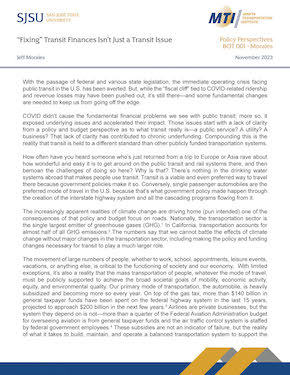- 408-924-7560
- mineta-institute@sjsu.edu
- Donate
“Fixing” Transit Finances Isn’t Just a Transit Issue
With the passage of federal and various state legislation, the immediate operating crisis facing public transit in the U.S. has been averted. However, while the “fiscal cliff” tied to COVID-related ridership and revenue losses may have been farther down the line, it’s still there—and fundamental changes are needed to keep us from going off the edge. In many European and Asian, transit is a viable and even preferred way to travel because government policies make it so. Conversely, single passenger automobiles are the preferred mode of travel in the U.S. because that’s what government supported through the creation of the interstate highway system and the myriad cascading programs flowing from it. Decades of highway-oriented policies have helped create the underlying funding and operating challenges facing public transit. To seriously tackle climate change and help our communities thrive, polices on transit and its critical role within the broader transportation network must be revisited.
JEFF MORALES
Jeff Morales is Chair of the Board of Trustees of the Mineta Transportation Institute at San Jose State University. He is a managing partner with InfraStrategies LLC, and is the former CEO of the California High-Speed Rail Authority and former director of the California Department of Transportation.
-
Contact Us
San José State University One Washington Square, San Jose, CA 95192 Phone: 408-924-7560 Email: mineta-institute@sjsu.edu






